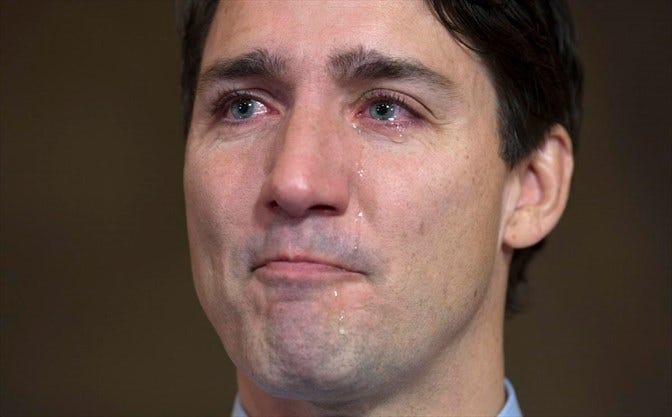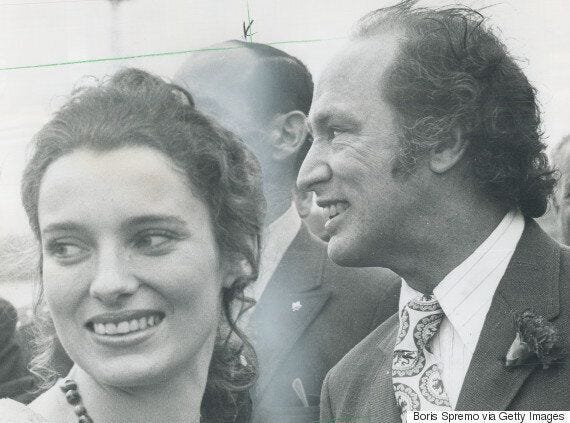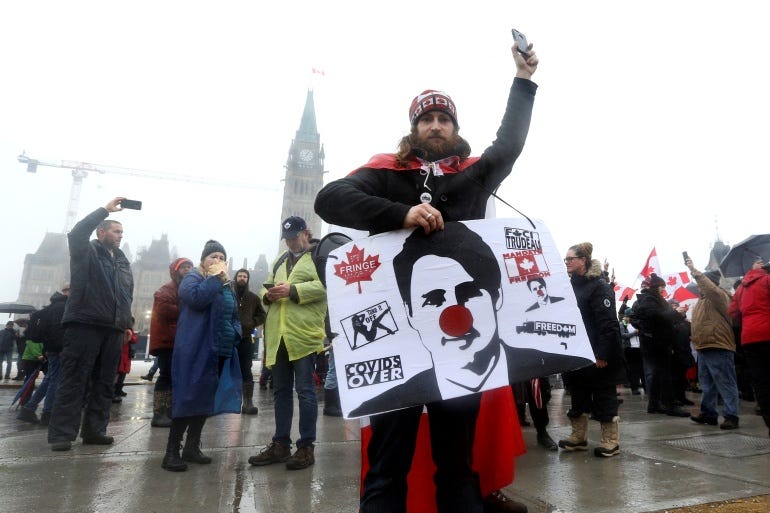Canada's Boy Emperor Is a Son of Feminism
A clue to his doubleness as tearful empath and harsh authoritarian may be found in his relationship with his self-preoccupied mother.
As a personality, Justin Trudeau is a study in contrasts. He came into power promising “sunny ways” and transparency in distinction from his predecessor, Conservative leader Stephen Harper.
Harper had often been criticized for being over-controlling and cold, a coldness allegedly captured in a much-decried photograph that showed him shaking hands goodbye with his young son after walking him to school. A good father, so the thinking went, would have shown more sincerity and warmth.
Cue the popularity of Justin Trudeau, who at first seemed all sincerity, even to the point of public spectacles of tearfulness and child-like ebullience. He was the first Canadian leader to march in the Gay Pride Parade as if it were his natural milieu, not merely a vote-seeking opportunity. His enthusiasm for Bollywood-style gyving, Hindu fancy dress, and participation in Islamic prayer, though heavily criticized, seemed genuine, at least in a high-school drama teacher way.
When he refused to give a real answer to the question of why it was necessary to appoint a gender-equal cabinet as one of his first actions upon assuming office in 2015, his insouciant quip “Because it’s 2015” suggested an unstudied feminist commitment. His comments after the Boston bombings emphasized that empathy rather than harshness was the appropriate response to murderous acts of terror.
But there has always been a harsher side to Trudeau, a fondness for dictators, an attraction to brute power, and an inability (or unwillingness) to hide his contempt for political opponents. Perhaps his empathy for the Boston bombers was respect or even admiration for their willingness to use violence. Many were shocked by his open admission that one of the countries he most admired was the “basic dictatorship” of China. When churches burned across Canada in the summer of 2021 in response to the alleged discovery of “mass” graves at a residential school (a discovery that has not yet yielded a single body), Trudeau condemned the arson but hastened to say it was “understandable.” About Canadians who chose not to take the Covid-19 vaccines, he could not control his impatience, unleashing a volley of stigmatizing, scapegoating rhetoric. For the truckers who camped out in Ottawa amid a sea of Canadian flags and bouncy castles demanding vaccine mandates be revoked, he had a brutal contempt.
Which is he: the soft feminist with the fancy socks, joy in Gay Pride, and empathy for the marginalized? Or the hard, contemptuous leader who could oversee without flinching a violent RCMP crackdown on the Convoy protest that saw an Indigenous woman trampled under the hoofs of a police horse?
The answer is: both. A clue to his doubleness may be found in his relationship with his mother.
I recently watched an old interview with Margaret Trudeau that offers some illuminating glimpses into the character of the woman who mothered Justin. The interview took place in 1979, after Margaret had left Pierre Trudeau, Justin's father, who was Prime Minister of Canada from 1968 until 1982. Pierre had primary custody of their three young children.
The interview shows a very beautiful woman whose consciousness of her attractiveness is a paramount part of her identity. She is not, as has sometimes been claimed, stupid; many of her answers to the interviewer are clever in the manner of a wayward adolescent convinced she can get away with nearly anything so long as she charms. At times she flirts openly, smiling suggestively, tongue protruding through her lips, confident in her sexual power.
The overall impact of her answers is horrifying for a viewer who fails to be enchanted. This is a woman who takes herself seriously but evidently does not take seriously her position as a mother to three young sons (all of them under 10 years old at the time)—and certainly not her position as estranged wife to the leader of the country.
She boasts girlishly about smoking marijuana, listening to psychedelic music, and giving up guilt over failing to meet others’ expectations. Spouting feminist rhetoric about being true to herself, she makes clear that she is more interested in having lovers than in looking after her children. She dismisses her husband’s shock at her unfaithfulness as owing to “old-fashioned principles of fidelity,” and indicates that Canadian society would be better off if more people heeded their “feelings” rather than stodgy moral precepts.
I cringe to think of Justin Trudeau, even today, watching this interview. The woman who presented herself therein—self-preoccupied, proudly promiscuous—must also have been evident to the son who watched her flamboyantly “find herself,” feminist-style, as his parents’ marriage crumbled.
A body language expert could have a field day with her gestures and movements, the pouting lips, her half-smiles, her probing tongue. But even confining oneself to the words alone, it doesn’t take a genius to hear the hippie-era feminist clichés that promote selfishness and irresponsibility as evidence of authenticity. In particular, Margaret made clear that holding oneself in debt to others’ needs was a “trip” she was determined to avoid.
Though she did not express overt bitterness towards her husband, she mentioned smilingly that it seemed a “pity” that Pierre could not accept her infidelity. She also condemned her husband because he allegedly appreciated her mainly as a “vessel” for the children he wanted; he was guilty, she believed, of an inability to see his wife as a whole human being rather than as a body to fulfill his desire for offspring (a criticism taken straight from the feminist theory of the age).
The video includes campaign footage showing that only a few years previously, Margaret Trudeau had said in front of a crowd of thousands that her husband was a very loving human being who had taught her a great deal about loving. Now, she claimed that he "didn't want the warmth" she offered, and that she had to leave him because she was so committed to "loving." She also spoke of herself as deeply bored by “normal,” not seeming to care that children love and need “normal.”
Her sons figured hardly at all, it seemed, in her turbulent emotional world.
One can only speculate what it must have done to the young Justin to realize that for his mother, the allegedly all-important experience of “loving” did not necessarily include him in any central way, and definitely did not include his father.
He must have recognized that if he wanted to catch and hold his mother’s fleeting attention, he would need to compete with other sources of attraction, many of them strangers. He had seen his mother publicly declare her love for his father—and then just a few years later publicly dismiss him.
There is obviously no single response to the experience of having a capricious, irresponsible, and narcissistic mother. But much about Justin observable in his behavior as political leader makes sense (if one accepts my armchair psychologizing) in relation to this dysfunctional primary bond.
As a boy, Justin would have grown up with a longing to please and secure his mother’s love alongside a deep insecurity about whether he was worthy of it. His mother had made it clear that she needed more than his father, and more than he and his brothers, could provide.
As he grew up, he would have tried to be the sort of man his mother said she wanted, in this case an embodiment of her expressed feminist ideals of being true to oneself, rejecting moral strictures, and honoring feeling. Justin Trudeau certainly learned to speak the language of feeling (it is in fact his primary political language): a rhetoric that does not necessarily correspond to any actual acts of constancy, patience, or forbearance.
As a boy, Justin learned that traditional masculinity, with its adherence to rule-based behavior and the control of emotions, was to be rejected.
In power, Justin showed his feminist-compliant authority by never judging women or holding them to traditional roles. He “believed” them—even to the point of suspending two Liberal MPs when women complained about (extraordinarily vague and dubious) sexual misconduct. As his mother had made clear, women should not be treated as vessels for men’s desire. This feminist principle was an oft-sounded theme of Justin’s reign, showing that he had taken his mother’s perspective to heart (though his own record on this score was not pristine).
A boy abandoned by his mother also resents her for her dereliction, her failure to care or fulfill her promises, not only towards him but towards his father too. The mother has made him vulnerable, uncertain in himself. By not loving him in the way a child needs to be loved, she left him uncertain how to be a man a woman would love.
The man, then, oscillates between self-doubt and anger. Such oscillation was vividly on display in Justin’s public response last winter to the truckers’ convoy, when he at first retired from public view on the suggestion that the truckers constituted some sort of physical threat. This move looked weak, ridiculous. He might have defused the truckers’ challenge with a series of meetings and negotiations, but it seemed that he couldn’t even look their way, let alone walk a few meters from his office on Parliament Hill to sit down with them.
Instead, he announced publicly that the thousands of working people who descended on Ottawa were a “fringe minority” who held “unacceptable views.” Some weeks later, having made no attempt to address their actual and not unreasonable demands, he unleashed the full power of the state to crush them, invoking the Emergencies Act and instructing riot squads to move in; freezing bank accounts and suspending licenses; even threatening to take away their dogs. The outsize fury of the response, the personal nature of the desire to permanently disable those who opposed him politically, bespoke a corrosive, threatened machismo.
Outside of his feminist causes and command of soft rhetoric about Canadian caring, Trudeau revealed that he lacks the ability to respond rationally and productively to domestic problems.
For years, he got away with inanities about budgets balancing themselves and other howlers because he made it seem churlish to insist on specifics or logic when his overall vision and self-presentation were so appealing.
As a leader, Justin over-personalized most issues, turned on those he perceived as betraying him (as Jody Wilson-Raybould can attest), and often could not or would not hide his rage.
The truckers, whatever their own circumstances and upbringing, presented a masculinity very different from Justin Trudeau’s, and one that he obviously found alien and disquieting. These were men who expressed themselves not through feminist rhetoric or stylish clothes but through technical competence and undeniable strength. Being alone on the road, responsible for one’s rig, driving very long hours and being away from family require extraordinary mental and physical toughness. Quite aside from their demands—the lifting of an irrational and punitive vaccine mandate having nothing to do with safety—their direct-action approach was explicitly opposed to the verbally evasive, passive-aggressive style Justin has always preferred.
The consequence of Justin’s self-dividedness—the personal viciousness combined with the sentimental rhetoric and pretense of inclusion—was made vividly evident in February, with his Emergencies Act power grab and unnecessary quashing of peaceful political resistance. In the process, this poorly-mothered son of feminism has become one of the least tolerant, most divisive, and harshest rulers Canada has ever known.








Another insightful piece. I think you are right about Trudeau's feminist-learned fear and contempt for masculinity. Traditional men have their place in the feminist world as tamed circus lions. Recall Trudeau initially praised the truckers for their work at the beginning of the pandemic. But those men from the wild who refuse to obey are an "existential threat"(a term the corporate media often uses on former President Trump), and all the collective power of the state must be brought to bear to crush them.
Thanks for this highly engaging and thought-provoking piece. My take on Trudeau, at least since the truckers' convoy and his response to it opened my eyes, was that he was just a typical weak man who, given power, overcompensates for his weakness by being overly harsh and in ways that truly strong men would never do or need to do. His treatment of the truckers was just so obviously unnecessary and overblown. I had no idea about his mother who sounds like a woman who could damage any kid.